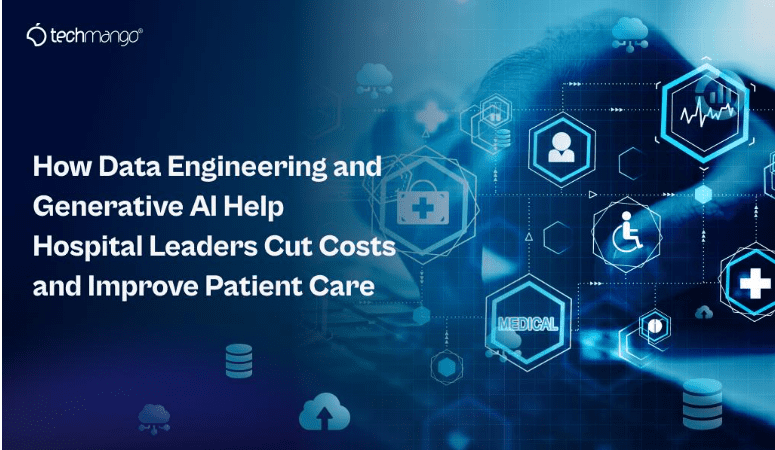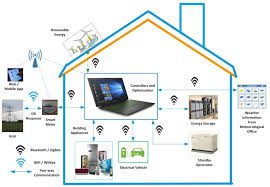How Data Engineering and Generative AI Help Hospital Leaders Cut Costs and Improve Patient Care

Why UAE Hospitals Are Looking at Data Engineering and Generative AI
UAE’s healthcare industry is changing fast, not only in medical technology, but in how hospitals deal with and utilize their data. With growing patient volumes, increasing expenses, and new government guidelines, hospital executives are being forced to provide higher-quality care on less.
That’s where data engineering and Generative AI enter the scene. Together, they’re helping hospitals make better decisions, automate workflows, and lower costs , all without sacrificing patient care.
Understanding Data Engineering in Healthcare
What Data Engineering Means for Hospitals
Data engineering in healthcare UAE is all about building a solid foundation for how hospitals gather, process, and utilize their data. From medical imaging and patient admissions to billing systems and IoT devices, all of them produce valuable information. Without an organized system in place, however, much of that remains untapped.
Data engineering assists in structuring and cleaning this data , making it accurate, accessible, and prepared for analysis. Done correctly, it becomes the foundation for all data-driven efforts within the hospital.
Why Data Engineering Is Important
Several UAE hospitals are plagued by siloed systems and legacy databases. Not only does this cause inefficiencies, but it also hinders the capacity to monitor patient outcomes or predict resource requirements. Through healthcare data engineering investments, leaders can:
- Consolidate data from departments and systems
- Make real-time visibility into operations possible
- Facilitate predictive analytics to improve decision-making
- Enhance compliance with the UAE’s data governance regulations
Real Example:
A leading private hospital in Dubai recently integrated a centralized hospital data system built on cloud architecture. The result? A 20% reduction in administrative costs and a 30% faster turnaround in lab reporting, improving both efficiency and patient satisfaction.
What Generative AI Brings to Healthcare
What Generative AI Means in Simple Words
Generative AI in hospitals refers to AI that is able to produce new output , whether that’s producing medical summaries, writing discharge notes, or forecasting future health threats based on patient information.
Whereas regular AI is more about pattern recognition, Generative AI takes things to the next level, it produces useful insights and streamlines content production that used to take hours of human effort.
Practical Uses in UAE Hospitals
In UAE hospitals, Generative AI in healthcare is already deployed to:
- Summarize patient histories from voluminous records
- Automate generation of medical reports
- Tailor patient communication
- Aid doctors in diagnosis based on medical imaging data
It’s not replacing doctors , it’s making them more able to focus on patients and less on paperwork.
How is AI Used in Healthcare Data?
AI is transforming the way hospitals utilize data. From predictive analytics that forecast patient influx to AI-driven diagnostics that minimize human error, its applications are vast and expanding.
Data Privacy and UAE Regulations
As increasing dependence on data grows, compliance is essential. UAE’s Personal Data Protection Law (PDPL) requires hospitals to secure patient data, guarantee consent-based utilization, and ensure transparency.
Clean, traceable data pipelines made possible by well-designed data engineering systems make compliance more manageable.
How Data Engineering and AI Work Together
Building the Foundation
Data engineering lays the foundation; AI adds intelligence on top. A hospital’s data engineering infrastructure ensures that all data , from patient monitoring equipment to billing systems , feeds into one, trusted source.
Examples of How They Combine
- A data pipeline gathers patient vitals in real-time.
- Generative AI takes that data and forecasts risks such as cardiac arrest or infection.
- Clinicians are notified prior to the condition worsening.
This collaboration of organized data and smart models encourages proactive care over reactive treatment.
Impact on UAE Hospital Operations
For hospital executives, the impact is quantifiable: fewer readmissions, better resource allocation, and enhanced care coordination , all enabled by robust hospital data systems.
What are the Benefits of AI in Hospitals?
Strategically used, AI provides:
- Cost efficiency: Automated documentation and scheduling release staff time.
- Quicker diagnostics: AI-powered imaging shortens human review time.
- Operational transparency: Leaders have real-time insight across departments.
- Predictive care: Early detection of high-risk patients lowers long-term costs.
These measurable improvements directly contribute to healthcare cost reduction in the UAE.
Faster Diagnosis and Better Treatment
AI models process thousands of medical images in seconds to assist radiologists in detecting anomalies earlier. Paired with structured data pipelines, hospitals can instantly access patient records , accelerating treatment decisions and supporting AI for better patient care in the UAE.
Better Patient Experience
Imagine a patient being sent automated post-discharge instructions in plain language , created by AI, verified by physicians. It’s quicker, uniform, and enhances engagement.
Real Case Example
An Abu Dhabi healthcare provider used an AI-driven data analytics platform to forecast emergency department demand. In six months, wait times fell by 25%, and patient satisfaction improved dramatically.
Key Focus Areas for UAE Hospital Leaders
Start Small and Build Up
Start small with a pilot , e.g., automating a single data pipeline or applying AI to a single department. Measure results before scaling.
Build Strong Data Systems
A solid data engineering base guarantees AI reliable inputs. Clean data is better data.
Partner with Trusted Experts
Collaborate with data engineering and Generative AI service providers who have hands-on experience with healthcare compliance and UAE market requirements.
Keep Data Transparent
Transparency establishes patient trust , non-negotiable in contemporary healthcare.
Conclusion:
UAE hospitals are at a turning point , where data-driven productivity converges with intelligent automation. Data engineering provides the foundation for reliability, and Generative AI presents new opportunities. Combined, they’re helping hospital executives reduce expenses, improve operational effectiveness, and provide improved patient results.
Techmango, assists healthcare institutions in the UAE to architect and deliver scalable data engineering systems and AI solutions that produce measurable clinical and business impact.
Let’s create the next generation of intelligent healthcare , one data pipeline at a time.

Source: How Data Engineering and Generative AI Help Hospital Leaders Cut Costs and Improve Patient Care



